Transferts monétaires et mobilité humaine
Les transferts monétaires sont souvent utilisés lors de crises afin de répondre aux besoins des personnes migrantes. Dans cette page, vous trouverez des ressources sur les transferts monétaires et la migration.

La Croix-Rouge se prépare à fournir une aide humanitaire aux migrant·es de la caravane sur le point de quitter le Honduras pour le Guatemala.
©Johannes Chinchilla / FICR.
Conflits, crises économiques et catastrophes sont autant de raisons ayant contraint des personnes à fuir et à traverser des frontières dans des conditions éprouvantes et risquées, en quête de sécurité et de moyens de subsistance. En 2020, le nombre de personnes déplacées de force s’est envolé au niveau sans précédent de plus de 80 millions de personnes, soit près du double du nombre enregistré il y a une dizaine d’année. Cette tendance s’aggrave et les effets du changement climatique menacent de déplacer jusqu’à 200 millions de personnes d’ici 2050.
L’assistance monétaire est de plus en plus utilisée afin de répondre aux besoins des personnes en situation de déplacement. On y a eu recours à grande échelle dans différents contextes de migration, en Europe en 2015 jusqu’au Venezuela pour « los caminantes ». Elle a également été utilisée dans d’autres crises migratoires, notamment en Amérique centrale, au Sahel, en Méditerranée et dans la Corne de l’Afrique. L’assistance monétaire est à l’heure actuelle l’une des principales formes d’aide apportée aux populations déplacées en Ukraine et dans les pays voisins.
Il existe une myriade de perspectives et de définitions concernant le mot « migrant·e » et la façon dont les humanitaires doivent agir. C’est pourquoi nous ne choisissons pas une définition unique pour le moment, étant donné que les discussions sur l’assistance monétaire et la migration en sont encore à leurs prémices et que le langage évolue encore.
Documenter et partager les données probantes donnera lieu à des interventions plus efficaces. Cette page contient une sélection de ressources utiles concernant la migration et le recours à l’assistance monétaire. Elle sera mise à jour au fil des discussions ayant lieu dans les espaces humanitaires des transferts monétaires.
Priorités actuelles
Afin de contribuer aux progrès relatifs à cet enjeu, nous nous engageons à :
- soutenir la création de données probantes aux niveaux régional et mondial ;
- contribuer aux solutions pratiques visant à mettre en œuvre les transferts monétaires auprès des personnes migrantes ;
- organiser des discussions sur les enjeux majeurs basées sur des données probantes.
Contenu récent

Understanding the Demand for Financial Services in Nepal
Report
Nepal has a unique geography consisting of mountains, hills and Terai, which makes it difficult for any financial institution to provide financial services to every part of the country. Formal and informal financial service providers have been attempting to reach more customers at various levels and...

Travailler avec les banques: un guide pratique de négotiation
Guides et outils
Ce mini-guide donne des conseils pratiques sur comment négotier et travallier avec les banques pour la planification et mise en oeuvre des programmes de transferts monétaires en urgence.

Étude de cas : préparation de la mise en oeuvre à grande échelle des programmes de transferts monétaires dans les situations d’urgence
Case Study
La Fédération internationale des Sociétés de la Croix-Rouge et du Croissant-Rouge (Fédération internationale) a collaboré, entre mai 2012 et décembre 2013, avec les Sociétés nationales de quatre pays pilotes – Croix-Rouge philippine, Croix-Rouge du Viet Nam, Croix-Rouge sénégalaise et...
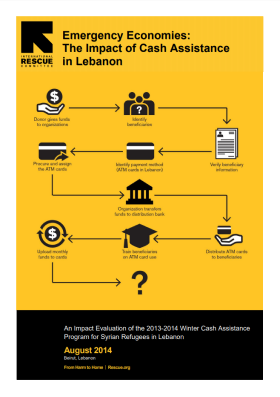
Emergency Economies: The impact of cash assistance in Lebanon
Report
An impact evaluation of the 2013-2014 winter cash assistance program for Syrian refugees in Lebanon. This report describes the impacts of the winter cash transfer program run by UNHCR and partners from November 2013 to April 2014. The program gave $575 USD via ATM cards to 87,700 registered Syrian...

Cash for Work Programmes Standard Operating Procedures – Lebanon
Guidelines and Tools
The document intends to define the roles of responsibilities of all the actors involved in the Cash for Work (hereinafter CfW) activities being developed by Action Contre la Faim (hereinafter ACF) and his partners in Lebanon.

Leveling the Playing Field: How do we make social protection more transformative?
Policy paper
Today social protection has a central place in development agenda. It is no longer seen just as protection for the poor but also as a way to promote growth by transforming the poor into a productive force to boost national economies. Nepal adopted this idea earlier than many other countries in the region....

Understanding the Interaction Between Women’s Economic Empowerment and Gender Based Violence: Study on ACF’s cash transfer programme in northern Uganda
Report
This paper presents findings of a qualitative study conducted in Northern Uganda, on the effects of a cash transfer programme on gender relations and GBV in a post – conflict context. The intervention in focus is Action Against Hunger |ACF International (ACF)’s ‘Combating Gender Based Violence and...

The Public Pursuit of Secure Welfare: Background Paper on International Development Institutions, Social Protection & Developing Countries
Report
This paper provides an overview of the development of the conceptual framework underlying social protection programming and policy among the key international development institutions active in this sector. It sets out the historical, institutional and political factors underlying the current debate,...

Rapid Assessment for Markets (RAM) – Guidelines for an initial emergency market assessment
Guidelines and Tools
In today’s world, people’s livelihoods depend to a significant extent on markets. Sudden shocks can severely limit how markets function and, as a result, drastically reduce people’s access to essential commodities. This International Red Cross and Red Crescent Movement publication is designed to...
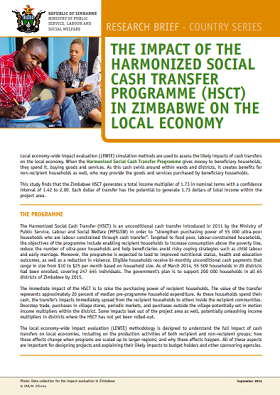
The Impact of the Harmonized Social Cash Transfer Programme (HSCT) in Zimbabwe on the Local Economy
Report
Local economy-wide impact evaluation (LEWIE) simulation methods are used to assess the likely impacts of cash transfers on the local economy. When the Harmonized Social Cash Transfer Programme gives money to beneficiary households, they spend it, buying goods and services. As this cash swirls around...

Philippines Typhoon Appeal: Contribution to Change Evaluation
Report
Typhoon Yolanda (known internationally as Haiyan), hit Eastern Samar, Leyte and Central Visayas in the Philippines on November 8, 2013, and is one of the strongest typhoons ever recorded. A total of 16 million people were affected; 6,300 died, 4.1 million were displaced, and 1.1 million houses were...
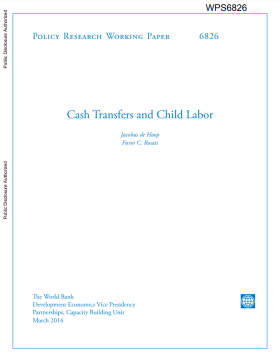
Cash Transfers and Child Labor
Policy paper
Cash transfer programs are widely used in settings where child labor is prevalent. Although many of these programs are explicitly implemented to improve children’s welfare, in theory their impact on child labor is undetermined. This paper systematically reviews the empirical evidence on the impact of...
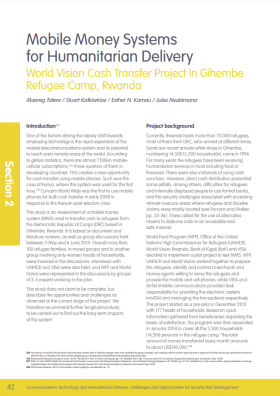
Mobile Money Systems for Humanitarian Delivery: World Vision cash transfer project in Gihembe refugee camp, Rwanda
Report
One of the factors driving the steady shift towards employing technology is the rapid expansion of the mobile telecommunications system and its potential to reach even remote areas of the world. According to global statistics, there are almost 7 billion mobilecellular subscriptions, three-quarters of them...

Croix-Rouge chilienne Projet pilote de préparation à la réalisation de transferts monétaires
Rapport
La Fédération internationale a travaillé avec les quatre pays pilotes entre mai 2012 et décembre 2013 pour que ces Sociétés nationales puissent répondre sur une grande échelle aux besoins en secours à l’aide de programmes de transferts monétaires, en les mettant en oeuvre plus...
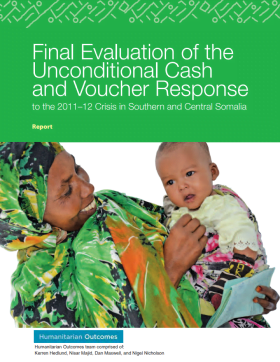
Final Evaluation of the Unconditional Cash and Voucher Response to the 2011–12 Crisis in Southern and Central Somalia
Report
This report sets out to determine the effectiveness of the unconditional cash and voucher interventions in southern and central Somalia. This evaluation however cannot be limited to the interventions at hand. It necessarily considers the broader context that led to the failure of the humanitarian...

Cash for Work Fact Sheet – Lebanon
Guidelines and Tools
The following fact sheet outlines: – Why opt for CFW intervention in South Lebanon – Selection of beneficiaries, Daily wage rate and Logistics – Implementing CFW in Lebanon

Surveying Livelihoods Service Delivery and Governance: Baseline evidence from Nepal
Report
In 2012/13, SLRC implemented the first round of an original cross-country panel survey in Nepal designed to produce information on: people’s livelihoods (income-generating activities, asset portfolios, food security, constraining and enabling factors within the broader institutional and geographical...

Cash-Based Assistance Programmes for Internally Displaced Persons in the Kabul Informal Settlements
Report
To improve aid delivery and effectiveness, Welthungerhilfe (WHH) piloted during the 2013/2014 winter a mobile-based cash assistance programme aimed at supporting IDP families living in the Kabul informal settlements (KIS) using Roshan’s M-PAISA service. To assess the strengths and...

The EU and Social Protection in Africa
Report
The European Report on Development recommends that the EU should make social protection an integral and central component of its development policy. But what can the EU bring to the social protection agenda of African and other developing countries?

Market Analysis Guidance (MAG)
Report
The Market Analysis Guidance (MAG) suggests processes and tools aimed at integrating market analysis into the different phases of the project cycle, taking the existing Red Cross and Red Crescent (RC/RC) Movement’s technical documents into account whenever possible. The MAG was commissioned and...